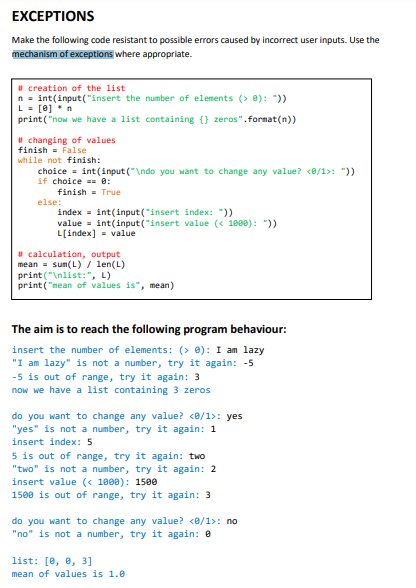unexpected indent python
Publicado por Santiago (1 intervención) el 13/12/2020 19:05:52
Hola muy buenas, tengo que resolver un ejercicio para programación y me he quedado muy estancado, el ejercicio lo debemos resolver mediante "excepciones (try/except)" y actualmente tengo gran parte avanzado pero me he quedado bloqueado en un punto y no sé como seguir. Si alguien me pudiera ayudar a resolver el problema sería de gran ayuda ^^. Les dejo una foto del ejercicio y el código que tengo escrito de momento tanto en imagen y .rar como en escrito y enlace al ejercicio :D
http://www.hnilica.wz.cz/homeworks/HW_08.pdf

http://www.hnilica.wz.cz/homeworks/HW_08.pdf
1
2
3
4
5
6
7
8
9
10
11
12
13
14
15
16
17
18
19
20
21
22
23
24
25
26
27
28
29
30
31
32
33
34
35
36
37
38
39
40
41
42
43
44
45
46
47
48
49
50
51
52
53
54
55
56
57
58
59
60
61
62
# creation of the listcorrect = Falseprint("insert the number of elements (<0): ", end = " ")
while not correct: try:n = int(input())
L = [0] * n
if n > 0 and int:
print("now we have a list containing {} zeros".format(n))
correct = True else:print(n, "is out of range, try it again: ", end = " ")
except ValueError as e:print(e,"is not a number, try it again: ", end = " ")
# changing of valuesfinish = FalsefnInd = Falsefinval = Falseprint("\ndo you want to change any value? <0/1>: ", end = " ")
while not finish: try:choice = int(input())
if choice == 0:
finish = True else:if choice != 1:
print(choice, "is out of range, try it again: ", end = " ")
else: finInd = Falseprint("insert index: ", end = " ")
while not finInd: try:index = int(input())
if index <= n:
finInd = True else:if index > n:
print(index, "is out of range, try it again: ", end = " ")
else: finval = Falseprint("insert value (<1000): ", end = " ")
while not finval: try:value = int(input())
if value < 1000:
finval = True else:if value > 1000:
print(value, "is out of range, try it again: ", end = " ")
L[index] = value
# calculation, outputmean = sum(L) / len(L)
print("\nlist:", L)
print("mean of values is", mean)
- pruebas1.rar(667,0 B)
Valora esta pregunta


0
